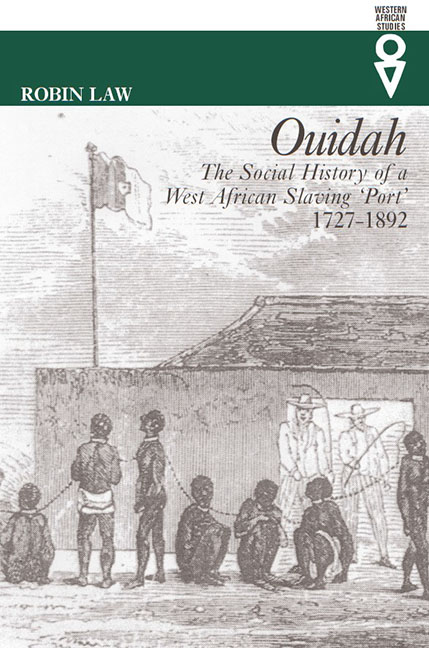Book contents
- Frontmatter
- Dedication
- Contents
- List of Maps & Tables
- Acknowledgements
- Abbreviations
- Map
- Introduction
- 1 Origins: Ouidah before the Dahomian conquest
- 2 The Dahomian Conquest of Ouidah
- 3 Dahomian Ouidah
- 4 The Operation of the Atlantic Slave Trade
- 5 De Souza's Ouidah The era of the illegal slave trade 1815 –39
- 6 The Era of Transition From slaves to palm oil 1840–57
- 7 Dissension & Decline Ouidah under King Glele 1858–77
- 8 From Dahomian to French Rule 1878-92
- Sources & Bibliography
- Index
6 - The Era of Transition From slaves to palm oil 1840–57
Published online by Cambridge University Press: 25 October 2017
- Frontmatter
- Dedication
- Contents
- List of Maps & Tables
- Acknowledgements
- Abbreviations
- Map
- Introduction
- 1 Origins: Ouidah before the Dahomian conquest
- 2 The Dahomian Conquest of Ouidah
- 3 Dahomian Ouidah
- 4 The Operation of the Atlantic Slave Trade
- 5 De Souza's Ouidah The era of the illegal slave trade 1815 –39
- 6 The Era of Transition From slaves to palm oil 1840–57
- 7 Dissension & Decline Ouidah under King Glele 1858–77
- 8 From Dahomian to French Rule 1878-92
- Sources & Bibliography
- Index
Summary
In contrast to the obscurity of the history of Ouidah during the first four decades of the nineteenth century, a relative abundance of documentation becomes available from the 1840s onwards. Principally, this comes from a series of foreign, mainly British, visitors, who left extended accounts, beginning with the missionary Thomas Birch Freeman in 1843 and including the explorer John Duncan in 1845. In addition, by the 1840s British and French merchants were engaged in trade in palm oil at Ouidah, some records of whose activities are preserved. This was followed by the involvement in Dahomian affairs of European governments, beginning with Portugal, which reoccupied its fort in Ouidah in 1844. British negotiations with the Dahomian authorities for the ending of the slave trade from 1847 involved a series of missions that passed through Ouidah and the maintenance of a vice-consulate in the town in 1849 and 1851–2; besides the official records of these contacts, one of those involved, the naval officer Frederick Forbes, published a lengthy account of his experiences in three visits to Ouidah in 1849–50. The French government, responding to the perceived threat of preemption by the British, also negotiated with Dahomey for commercial privileges, beginning with a treaty in 1851 and continuing in further diplomatic missions in 1856 and 1858. In addition, a British Methodist mission operated in Ouidah from 1854, which, although a failure in terms of its own agenda of evangelization, nevertheless provides useful documentation of its interactions with the local community. There is also an unprecedentedly detailed local source for this period, in the correspondence of the Brazilian trader Jose Francisco dos Santos, which survives for the years 1844–7. The papers of the Lawson family of Little Popo to the west likewise include correspondence from the period 1843–53, which makes frequent reference to links to Ouidah.
Besides being relatively well documented, the 1840s and 1850s also comprise a critical period of transition in the history of Ouidah, with the decline of the Atlantic slave trade and the rise of an alternative export trade in palm oil.
- Type
- Chapter
- Information
- OuidahThe Social History of a West African Slaving Port 1727-1892, pp. 189 - 230Publisher: Boydell & BrewerPrint publication year: 2017



